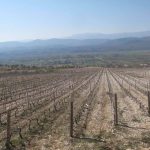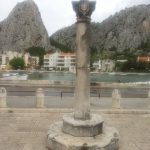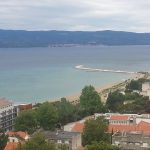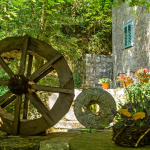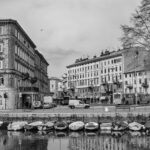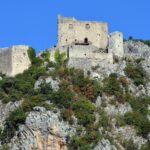Runović, a village nestled between the Imotski valley and Mračaj hill, can boast of lately being the centre point of production of the best Dalmatian prosciutto. We are talking of Mijo Lešina and his company Mijukić Prom, whose 40 employees now annually produce 120.000 prosciuttos and 500 tons of bacon. Lately the Runović residents are also proud of young Frano Buljan, from the Kayak-Canoe Club Mračaj on the Vrlika River, who is now the junior Croatian champion in kayaking. However, when you ask anyone from Runović what they are most proud of, there is no doubt they will mentioned football and Kujundžuša, the variety grown on almost 90 percent of wine growing surfaces of the Imotski valley.
“My family has practically been in wine production forever, and my late father began more serious production in 1998. Living in Runović means constant contact with vines, as we are surrounded by vineyards, so without exaggeration we can all say we were born in the vineyard. And with a football,” says Mate Jerković, a winemaker from Runović who continues the family tradition of producing superior Kujundžuša his recently deceased father Ivan returned to the pedestal of deserved worship.
“Kujundžuša in Runović means everything! My father told me a long time ago that he will never understand why Kujundžuša was never treated the way it should be in the wine world. He was truly the first winemaker who elevated Kujundžuša to a deserving level. He told me there used to be a line of 150 metres in Split to purchase Kujundžuša!”
Mate was well on his way to become the football pride of Runović which, unusually, “gave” three captains of the Croatian national football teams of Yugoslavia and Croatia – Iko Buljan, Ivica Gudelj and Zvonimir Boban, also the starting point for Branko Tucak and Stanko Mršić. Mate spent his formative football days in Osijek where he, coming from Mračaj as a boy and playing for NK Osijek in the cadet and junior teams, experienced what it means to be confidently best, especially when they easily defeated stronger teams such as Hajduk (5-0) and Dinamo (5-2). Not just any Dinamo, Mate’s peers from the Zagreb club leaving the fields with their heads down were Niko Kranjčar and Eduardo da Silva!
“It was an awesome generation, with Karlo Primorac going on to more fame. When coach Stanko Poklepović took over, he included me as a junior in the first team. All my dreams came true. I am often asked what is it in Runović that so many famous footballers came from Mračaj and had great careers in large clubs. I don’t know, people here, as soon as they start to walk, get a ball to play with, just like me. And everyone tries to play in Mračaj which is currently in the third county league. But, this is not a tragedy, as Runović is a small place with two thousands residents and realistically belongs to that level. The problem is that Mračaj is struggling to stay on that level!”
Mate was predicted to have a shining career, but as he claims, he did not like many things in Croatian football and decided overnight not to become a professional footballer. His decision to enrol in the study of kinesiology in Zagreb was not announced to the family, not even his father who was convinced Mate would study agronomics.
“In the end I graduated from kinesiology in Zagreb. I remember, while I was still in Osijek, where I finished high school, my father came and did not know about my choice, bringing along a full trunk of books for passing the entrance exam for agronomics. I hadn’t told him at that point of my choice. After I got in, I only told him: “I got in, I was third on the list!” He was thrilled, such an outburst of emotions I never saw from him, I believe that was the first time he hugged and kissed me, which is quite odd for us from this area. Only then did I tell him I would study kinesiology, not agronomics. He just left the house and did not show up for three days, no one ever found out where he went to soften his sorrow and disappointment. But we will correct this now as I have a 12 years younger brother who is in his second year of agronomics in Zagreb. Father’s dream will thus come true!”
During his studies in Zagreb Mate kept in shape by playing football for NK Lučko and several other lower ranked clubs, also training kids and later leading the youth school in a small local football club. During his time in NK Osijek and later, studying in Zagreb, Mate had many opportunities to be convinced what Kujundžuša means to his father who, right at the time of Mate’s schooling away from home, began a serious wine story that would mark their family as a forerunner in treating Kujundžuša as a superior wine.
“As soon as father began to be more serious about winemaking, he immediately decided to bottle wine, not even thinking about selling from the tank. We have been consistent to that so far, and will be in the future! Father was a special man, an enthusiast ahead of his time. I remember him winning an award at a local Kujundžuša competition of the Imotski area. He called me in Osijek and said to buy 30 copies of the papers which wrote about his success. I told him I have a feeling he would prefer winning a gold for his wine than for his son to play in Real Madrid. He answered: I would!”
Mate says he entered the family wine story through “a set of unfortunate circumstances,” although, he adds, he did not mind, as he was intent on returning to Runović.
“My parents somehow fell ill at around the same time, both with tumours. I have two older sisters, one is married in Imotski, the other is a public notary in Zadar, our younger brother in the second year of agronomics. He was still a child then… Sounds rough, but I had to take over the wine business, my brother needed to be raised, I had to come back. Unlike my late father, who elevated this entire wine story, I did not have to begin from scratch. I did have an imperative of maintaining a high quality of wine and, judging by reactions of which the most significant is that each year for about three months we have no wine in the cellar, I succeeded. In the last period of my father’s life I worked together with him in the winery. The two of us were similar in character so I picked up on everything quickly. As far as production technology, I had no questions before that. In that joint time in the winery I learned more from him about life and mutual respect and I will always say that “school” marked our relationship. If I wasn’t here, my younger brother could prepare a harvest on his own. In Runović, when asking about children, they will all say their children learn the best, but also that their wine is the best in the world.”
While Mate’s father Ivan devoted himself completely into producing the praised Kujundžuša, Mate went to school in Osijek and Zagreb believing the entire time that their Kujundžuša is the best in the world. After taking over the winery and completely immersing himself in the family wine story, Mate is now certain their Kujundžuša is – a very good wine. And when convinced of the quality of what he is producing, there is room for improvement. Towards fulfilling his father’s dream of meliorating karst above their old stone house and expanding the vineyard to an impressive 20 hectares.
“Right now in the vineyard I have just under 5.000 vines of Kujundžuša, which is almost an irrelevant quantity, so I am forced to work with subcontractors. However, when I expand the vineyard, for which I already have a concession, 80 percent of it will be Kujundžuša, 20 percent Rudežuša or Trnjak. Then the production of Kujundžuša will reach 150.000 bottles, a completely different story, especially when the new winery is built. As today I work in a crowded space in the cellars of two old stone houses from 1936, where tobacco used to be dried, but they had several large wooden barrels with around 6.000 litre capacity, which for the time was huge. Everything has changed, I surpassed that amount, gone beyond capacity. I hope by next harvest to expand and raise the level a bit. I could not do this sooner, as I had a truly specific situation with my parents and higher priorities.”
In the Imotski area it is not just old tobacco storage spaces that have become wineries looking for new, significantly larger spaces.
“We are getting much closer to tourism. If you had said to an ordinary man in Imotski several years ago that he would soon be building a house with a pool, they would say you are ill. Lately over 130 houses with pools have been registered in the Imotski area! The St. Ilija tunnel through Biokovo brought a lot for Imotski, it takes me from Runović to Makarska 25 minutes. So who will not develop production and try to be the best!”
For the original and more from the Vinske Priče blog on wine, click here.


